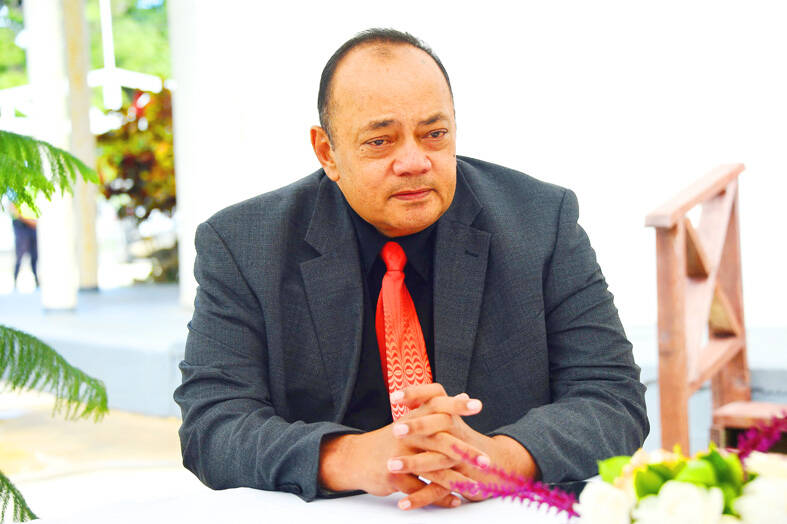Tongan Prime Minister Siaosi Sovaleni abruptly resigned yesterday, stepping down in the wake of a power struggle with the Pacific nation’s royal family.
Sovaleni has butted heads with Tonga’s influential King Tupou VI, fueling speculation of a deepening rift between the royals and his government.
In cryptic remarks delivered before announcing his shock resignation, Sovaleni suggested the country’s nobility was “fearful” of losing its sway.

Photo: AFP
“I thought this land had been given freedom, but there’s still enslavement,” he told parliament through tears. “I hope there’s a time where we’ll work together... If the nobility can do it and we can work together, we can achieve great things.”
Sovaleni resigned before facing a vote of no confidence brought on by opposition lawmakers yesterday afternoon. Tonga’s hereditary nobles occupy nine seats in the country’s 26-member legislative assembly. If the nobles voted as a bloc alongside the opposition, they would have enough numbers to force Sovaleni out.
It was not immediately clear who would replace Oxford-educated Sovaleni, who has been prime minister since 2021. Veteran politician and longtime rival ‘Aisake Eke is one of the likely frontrunners.
The line of Tongan kings and queens stretches back more than 1,000 years, according to a government history. Although the monarchy no longer enjoys the unbridled power of old, it remains one of the most dominant institutions across the Tongan archipelago. King Tupou VI penned a letter earlier this year saying he no longer had “confidence” in Sovaleni as Tonga’s armed forces minister.
Sovaleni refused to stand down from the portfolio, sparking a tense standoff between the two. Eventually Sovaleni backed down, delivering a traditional apology to the king and resigning from the armed forces ministry.
Although the details of the disagreement remain a mystery, it appears this was not enough to quell the bad blood between the two. Tonga overhauled its constitution after pro-democracy protests in 2006, which spiralled into angry riots that left swathes of the capital, Nuku’alofa, in smoking ruins.
At the time, the Tongan king held immense sway as the country’s head of state, head of government and military commander-in-chief. Although the monarchy eventually agreed to devolve much of its responsibility to a Cabinet of elected lawmakers, its power has not been totally diluted. The king still has the power to veto legislation, and appoints the prime minister on the advice of the Tongan parliament.
A developing country of about 106,000 people spread across dozens of islands, Tonga’s debt-laden government is seen as particularly vulnerable to economic pressure from China. It owes China’s export bank about US$130 million — almost one-third of its GDP. Repayments on that loan were scheduled to start spiking this year.

BACKLASH: The National Party quit its decades-long partnership with the Liberal Party after their election loss to center-left Labor, which won a historic third term Australia’s National Party has split from its conservative coalition partner of more than 60 years, the Liberal Party, citing policy differences over renewable energy and after a resounding loss at a national election this month. “Its time to have a break,” Nationals leader David Littleproud told reporters yesterday. The split shows the pressure on Australia’s conservative parties after Prime Minister Anthony Albanese’s center-left Labor party won a historic second term in the May 3 election, powered by a voter backlash against US President Donald Trump’s policies. Under the long-standing partnership in state and federal politics, the Liberal and National coalition had shared power

CONTROVERSY: During the performance of Israel’s entrant Yuval Raphael’s song ‘New Day Will Rise,’ loud whistles were heard and two people tried to get on stage Austria’s JJ yesterday won the Eurovision Song Contest, with his operatic song Wasted Love triumphing at the world’s biggest live music television event. After votes from national juries around Europe and viewers from across the continent and beyond, JJ gave Austria its first victory since bearded drag performer Conchita Wurst’s 2014 triumph. After the nail-biting drama as the votes were revealed running into yesterday morning, Austria finished with 436 points, ahead of Israel — whose participation drew protests — on 357 and Estonia on 356. “Thank you to you, Europe, for making my dreams come true,” 24-year-old countertenor JJ, whose

NO EXCUSES: Marcos said his administration was acting on voters’ demands, but an academic said the move was emotionally motivated after a poor midterm showing Philippine President Ferdinand Marcos Jr yesterday sought the resignation of all his Cabinet secretaries, in a move seen as an attempt to reset the political agenda and assert his authority over the second half of his single six-year term. The order came after the president’s allies failed to win a majority of Senate seats contested in the 12 polls on Monday last week, leaving Marcos facing a divided political and legislative landscape that could thwart his attempts to have an ally succeed him in 2028. “He’s talking to the people, trying to salvage whatever political capital he has left. I think it’s

A documentary whose main subject, 25-year-old photojournalist Fatima Hassouna, was killed in an Israeli airstrike in Gaza weeks before it premiered at Cannes stunned viewers into silence at the festival on Thursday. As the cinema lights came back on, filmmaker Sepideh Farsi held up an image of the young Palestinian woman killed with younger siblings on April 16, and encouraged the audience to stand up and clap to pay tribute. “To kill a child, to kill a photographer is unacceptable,” Farsi said. “There are still children to save. It must be done fast,” the exiled Iranian filmmaker added. With Israel